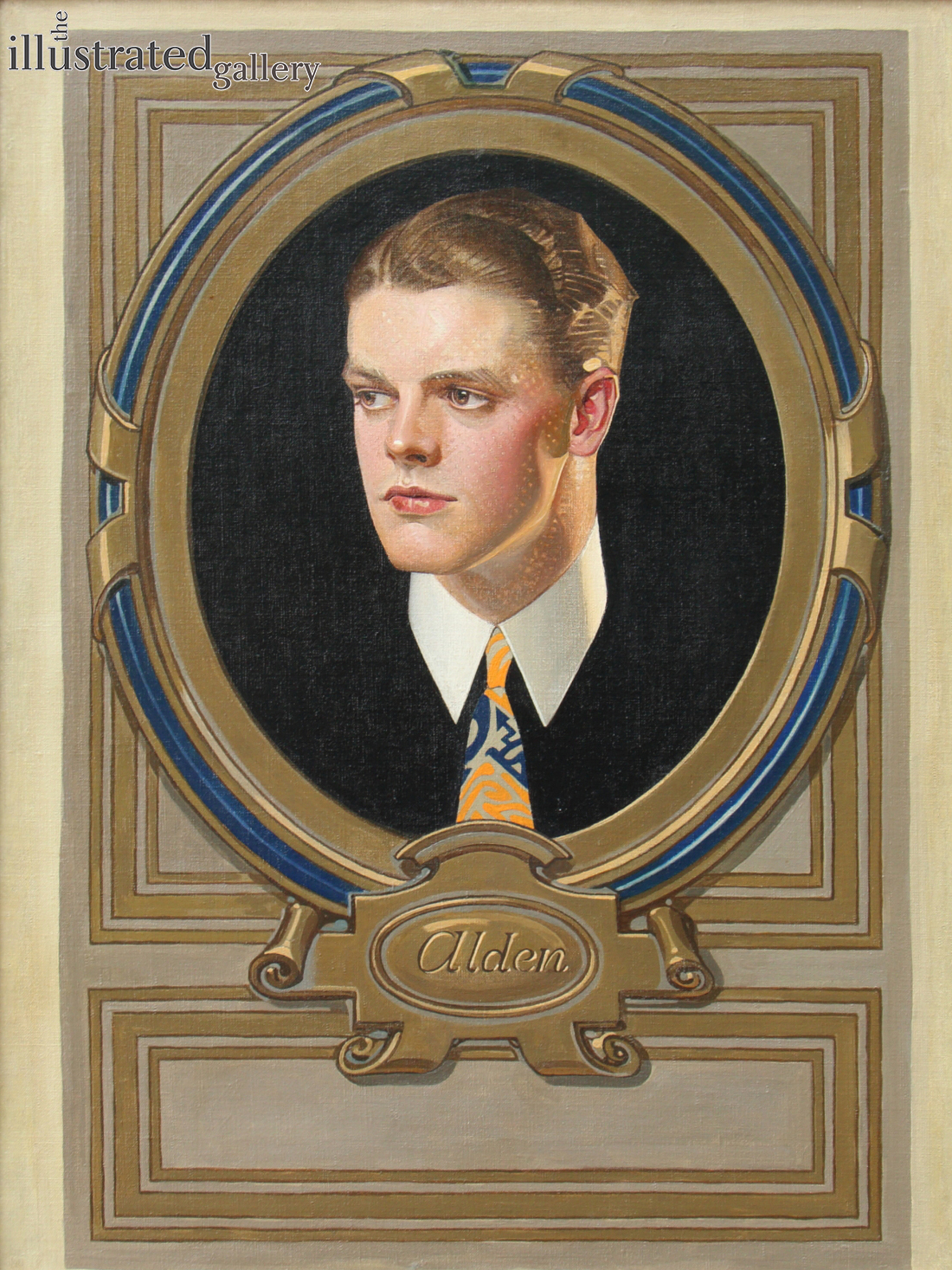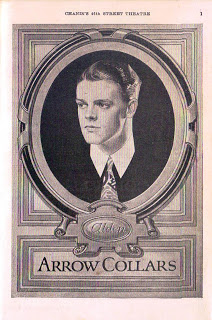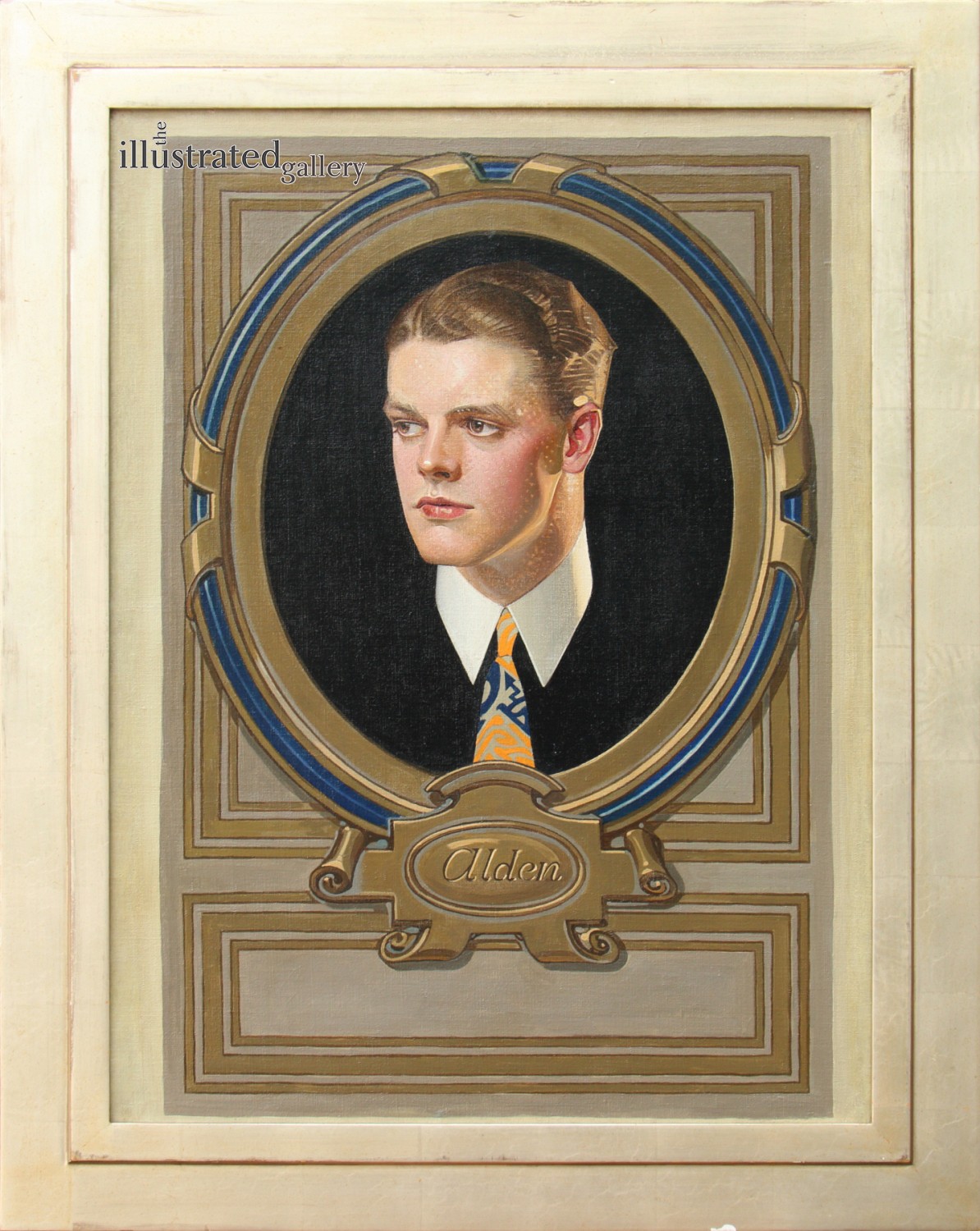"Alden, Arrow Collar Advertisement, 1922" Lot no. 3035
By Joseph Christian Leyendecker (1874-1951)
1922
27.90" x 21.00"
Oil on Canvas Laid Down on Board
Inscribed with Title (Lower Center)
REQUEST PRICE
PURCHASE REQUEST
Joseph Christian Leyendecker created the Arrow Collar Man in 1905 for Cluett, Peabody & Company, the manufacturer of a detachable collar for men's button-down shirts. Featured in several subsequent advertisements for the company, the figure grew beyond its advertising purpose into a cultural symbol of a lifestyle to which men of the time could aspire. Deborah Solomon explains that Leyendecker "was the brand name who created brand names. His Arrow Collar Man was a bona fide sensation--a handsome, square-jawed man in a freshly pressed shirt, his hair glinting like blond metal. A generation of college men regarded him as the go-to authority for fashion advice. Leyendecker single-handedly changed advertising by switching the emphasis from text to image and making his pitch in emphatically visual terms. Earlier, in the nineteenth century, most printed advertisements had been crammed with tiny, hard-to-read type imploring you to buy effective or ineffective remedies for your headaches and nerves and itchy skin. The Arrow Collar Man, by contrast, was selling a vision as much as a product. He was selling the notion that any man could acquire instant class by spending twenty cents on a detachable collar." (American Mirror: The Life and Art of Norman Rockwell, New York, 2013, p. 116)
Press:
L.S. Cutler, J.G. Cutler, J.C. Leyendecker: American Imagist, New York, 2008, pp. 80-81, illustrated.
Explore related art collections: $100,000 & Above / Men / Advertisements / Fashion
See all original artwork by Joseph Christian Leyendecker
ABOUT THE ARTIST
Joseph Christian Leyendecker was born in Montabaur, Germany, and came to America at the age of eight. Showing an early interest in painting, he got his first job at 16 in a Chicago engraving house on the strength of some larger pictures he had painted on kitchen oilcloth. In the evenings after work, he studied under Vanderpoel at the Chicago Art Institute, and saved for five years to be able to go to France and attend the Academie Julian in Paris.
Upon his return, as a thoroughly trained artist with immense technical facility, Leyendecker had no difficulty in obtaining top commissions for advertising illustrations and cover designs for the leading publications. His first Post cover was done in 1899, and he did well over 300 more during the next 40 years. Among the most famous of these was his annual New Years Baby series.
His advertising illustrations made his clients famous. The Arrow Collar Man was a byword for the debonair, handsome male, and women wrote thousands of love letters to him in care of Cluett Peabody & Company. His illustrations for Kuppenheimer Clothes were equally successful in promoting an image of suited elegance. He was elected to the Society of Illustrators Hall of Fame in 1977.A major retrospective exhibition of Leyendecker's work was mounted at the Norman Rockwell Museum in Stockbridge, Massachusetts, in 1997-98.
Joseph Christian Leyendecker was born in Montabaur, Germany, and came to America at the age of eight. Showing an early interest in painting, he got his first job at 16 in a Chicago engraving house on the strength of some larger pictures he had painted on kitchen oilcloth. In the evenings after work, he studied under Vanderpoel at the Chicago Art Institute, and saved for five years to be able to go to France and attend the Academie Julian in Paris.
Upon his return, as a thoroughly trained artist with immense technical facility, Leyendecker had no difficulty in obtaining top commissions for advertising illustrations and cover designs for the leading publications. His first Post cover was done in 1899, and he did well over 300 more during the next 40 years. Among the most famous of these was his annual New Years Baby series.
His advertising illustrations made his clients famous. The Arrow Collar Man was a byword for the debonair, handsome male, and women wrote thousands of love letters to him in care of Cluett Peabody & Company. His illustrations for Kuppenheimer Clothes were equally successful in promoting an image of suited elegance. He was elected to the Society of Illustrators Hall of Fame in 1977.A major retrospective exhibition of Leyendecker's work was mounted at the Norman Rockwell Museum in Stockbridge, Massachusetts, in 1997-98.
Kent Steine





